I think cinema, movies, and magic have always been closely associated. The very earliest people who made film were magicians.
-Francis Ford Coppola
Film is a language of ideas: each shot a director’s thought, every film a magical world of its own. Recently, on Netflix, I watched Mark Cousins’s monumental The Story of Film: An Odyssey, which consists of 15 one-hour chapters and some 900 minutes covering the history of film. The experience was like taking a semester-long film studies survey course spanning the birth of cinema to the movies of today and the future. Except, rather than travel to campus, take notes, or write an examination, I leisurely embarked on this odyssey from the comfort of my home, often in 30-minute increments over my lunch. Cousins’s thesis is a relatively straightforward one: the story of film is the history of innovation. From the opening chapter it is apparent that The Story of Film is hardly the tale of Hollywood, as Cousins’s radical, at times revisionist history covers not only studio pictures, but also film mavericks on the fringes of the studio system in America, Japan, India, Africa, Mexico, Italy, Britain, China, Korea, France, and elsewhere.
The Story of Film is global in scale, affording the viewer numerous opportunities to engage with the history of cinema from a non-and-decentering American perspective. By the mid-point of the series Cousins’s diatribes against Hollywood start to feel a little predicable and exaggerated, perhaps harder for some to digest given his metric vocal delivery and lilting Irish accent, but it was a pleasant reminder that film hardly belongs to America or Europe, as many of cinema’s greatest innovators/innovations were/happened in India, South America, Africa, Japan, China, or even, Canada. Through dozens of interviews with some of film’s most important progenitors and nonconformists, and hundreds of selected film clips with nuanced analysis from Cousins, the documentary is certainly an epic quest. The documentary played at the 2011 Toronto International Film Festival (TIFF) and I could only imagine what the experience might have felt like for those audience members who watched all 15+ hours over a few days. Watching The Story of Film reminded me that film is much more than a fascination of mine. Like my dedication to reading and music, film viewing is an Odyssean expedition where the discoveries are ongoing and illimitable, often far outside the American moviemaking machine. I also appreciated that The Story of Film introduced me to many great films I’ve never heard of, or had forgotten I had at one point or another intended to watch, or in the case of a few, rewatch. I’ve seen thousands of American films, including most of the AFI Top 100, and so the majority of films on my list were made outside America. I might have to visit an actual video store to find many of these titles, but here are some of the films featured in The Story of Film I hope to watch this year, ideally in chronological order:
- Intolerance (1916)
- Metropolis (1927)
- The Passion of Joan of Arc (1928)
- The Goddess (1934)
- Gone with the Wind (1939)
- The Great Dictator (1940)
- The Big Sleep (1946)
- The Third Man (1949)
- Gun Crazy (1950)
- Tokyo Story (1953)
- Cairo Station (1958)
- The House Is Black (1963)
- The Hand (1965)
- Daisies (1966)
- Black Girl (1966)
- Bonnie and Clyde (1967)
- The Fearless Vampire Killers (1967)
- The Conformist (1970)
- Performance (1970)
- Badlands (1973)
- The Holy Mountain (1973)
- In the Realm of the Senses (1976)
- Stalker (1979)
- Fitzcarraldo (1982)
- Come and See (1985)
- The Horse Thief (1988)
- A Short Film About Killing (1988)
- Jesus of Montreal (1989)
- Close-up (1990)
- Les Amants du Pont-Neuf (1991)
- Russian Ark (2002)
- Memories of Murder (2003)
- Oldboy (2003)


Reblogged this on the harsh light of day….